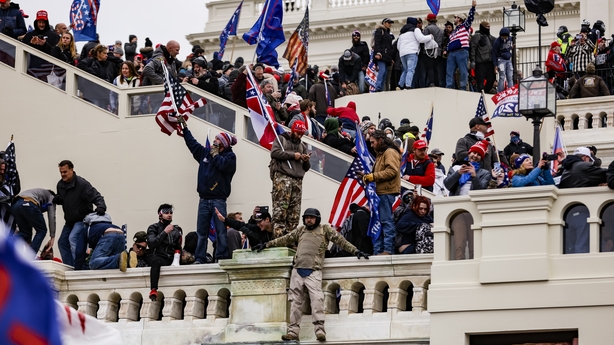The storming of the US Capitol by supporters of President Donald Trump has prompted calls by some politicians to remove him from office before President-elect Joe Biden is sworn in on 20 January.
There are two ways to remove a president from office: the 25th Amendment of the US Constitution and impeachment followed by a Senate conviction.
In either scenario, Vice President Mike Pence would take over until Mr Biden's inauguration.
A source familiar with the effort said there have been some preliminary discussions among some Cabinet members and Trump allies about invoking the 25th Amendment.
Democrat Ilhan Omar has tweeted that she is drawing up the articles for impeachment, saying that Mr Trump should be removed from office.
I am drawing up Articles of Impeachment.
— Ilhan Omar (@IlhanMN) January 6, 2021
Donald J. Trump should be impeached by the House of Representatives & removed from office by the United States Senate.
We can't allow him to remain in office, it’s a matter of preserving our Republic and we need to fulfill our oath.
What's the purpose of the 25th Amendment?
The 25th Amendment, ratified in 1967 and adopted in the wake of President John F Kennedy's assassination in 1963, deals with presidential succession and disability.
Section 4 addresses situations where a president is unable to do the job but does not step down voluntarily.
The drafters of the 25th Amendment clearly intended for it to apply when a president is incapacitated by a physical or mental illness, experts say. Some scholars have also argued that it could also apply more broadly to a president who is dangerously unfit for office.
For the 25th Amendment to be invoked, Mike Pence and the majority of Donald Trump's Cabinet would need to declare that Trump is unable to perform the duties of the presidency and remove him. Pence would take over, in that scenario.
Trump could subsequently declare that he is capable of resuming the job. If Pence and the majority of the Cabinet do not contest Trump's determination, Trump regains power.
If they dispute Trump's declaration, the issue would then be decided by Congress, but Pence would continue to act as president until then.
A two-thirds majority of both Chambers would be needed to keep Trump sidelined. But the Democratic-controlled House could simply delay voting on the substantive dispute until Trump's term ends, said Paul Campos, a professor of constitutional law at the University of Colorado.
Prof Campos said the 25th Amendment would be an appropriate way to remove Trump from office and has the benefit of being quicker than impeachment.
"Pence could instantly become president, whereas impeachment and conviction could take at least a few days," Prof Campos said.
Can Trump be impeached and removed?
Yes.
A misconception about "impeachment" is that it refers to the removal of a president from office.
In fact, impeachment refers only to the House of Representatives, the lower chamber of Congress, bringing charges that a president engaged in a "high crime or misdemeanour" - similar to an indictment in a criminal case.
If a simple majority of the House's 435 members approves bringing charges, known as "articles of impeachment," the process moves to the Senate, the upper chamber, which holds a trial to determine the president's guilt.
The Constitution requires a two-thirds vote of the Senate to convict and remove a president.
Trump was previously impeached by the Democratic-led US House in December 2019 on charges of abuse of power and obstruction of Congress stemming from his efforts to pressure Ukraine to investigate Biden and his son.
Trump was acquitted by the Republican-led Senate in February 2020.
What 'high crime and misdemeanour' could Trump be accused of?
Frank Bowman, a professor of constitutional law at the University of Missouri, said Trump "arguably fomented sedition," or an attempted overthrowing of the US government.

But Prof Bowman said Trump could also be impeached for a more general offence: disloyalty to the US Constitution and failing to uphold his oath of office.
Congress has discretion in defining a high crime and misdemeanour and is not limited to actual criminal offences.
"The essential offence would be one against the Constitution - one of essentially trying to undermine the lawful results of a lawfully conducted election," Prof Bowman said.

